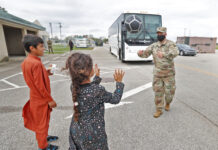DUBAI, United Arab Emirates — Dozens of protesters angry over firings and the poor economy of Oman marched through a major city Tuesday, marking a third day of demonstrations in the typically subdued sultanate.
The protests took place in Sohar, a city some 200 kilometers (125 miles) northwest of the capital, Muscat, which has become a flashpoint for the demonstrations.
Videos on social media showed a long line of riot police, as well as demonstrators at one point apparently throwing stones at them. The images corresponded to known landmarks around Sohar, the first major city people enter in the sultanate after crossing the border from neighboring United Arab Emirates.
Other videos showed demonstrators out late Monday night in Salalah, a city some 850 kilometers (525 miles) southwest of Muscat. Videos also showed arrests being made Monday by nightstick-wielding police. The Royal Oman Police has not acknowledged making any arrests.
The Gulf Center for Human Rights and the Omani Association for Human Rights said those arrested had seen their mobile phones confiscated by authorities. The activists also said media outlets in Oman, which are tightly monitored, were warned by authorities not to report on the demonstrations.
“The Omani government should immediately end the policy of silencing and restricting public freedoms, including freedom of peaceful protest and freedom of the press,” the groups said.
Oman’s state TV on Monday afternoon acknowledged that jobless people had been coming to Labor Ministry offices to “expedite the treatment of their conditions.” It also showed an image from one of the peaceful protests.
Oman’s Information Ministry and the Omani Embassy in Washington did not respond to requests for comment.
The demonstrations mark the first major unrest for Sultan Haitham bin Tariq, who took over in January 2020 after the death of the long-ruling Sultan Qaboos bin Said. State media on Monday referred to employment as “among the most important priorities” of Sultan Haitham.
Oman faces billions in looming loan repayments, including from China, and needs even more money as its youthful population wants jobs and its government cannot afford the cradle-to-grave benefits given in other Gulf Arab nations.



